Driving Efficiency and Best Practices: Pit Vidura’s Initiative to Empower Fecal Sludge Collection Companies for a Cleaner and Safer World
Data is a powerful tool, an essential element for any business that wants to be efficient and effective. For Pit Vidura, data has proved to be key to their continued success in providing fecal sludge collection to their local community while eliminating processes that don’t add value to their operations. Pit Vidura is committed to global sanitation coverage, and therefore committed to the success of fellow collection organizations. That’s why Pit Vidura is sharing the wealth and providing other fecal sludge collection companies with training in how to collect and analyze data about their processes.
Collecting and analyzing data is a skill that not every company has at their disposal, and many companies are reluctant to invest in data collection because it is time-consuming and they don’t fully understand how it can help them make informed decisions. Pit Vidura is working to change this.
Since 2016, Pit Vidura has been collecting data related to its operations in order to identify areas of improvement and put in place strategies to optimize its processes. They collect data including location, type of onsite sanitation facility, type of customers served, the emptying method used, service price, duration of service, and customer feedback. But without other fecal sludge collection companies collecting similar statistics, it’s impossible for Pit Vidura to carry out a comparative analysis and establish industry best practices.
The lack of data collected by similar organizations led Pit Vidura to establish an initiative to help other companies mimic their data collection practices. They started this initiative in Kampala, Uganda, where Pit Vidura worked with Forever Sanitation, a fecal sludge collection company that’s been operating there since 2013.
Forever Sanitation Truck after serving a customer using the barrel-based emptying method
Kampala is Uganda’s capital, home to around 1.5 million with over 60% of the population dwelling in informal settlements. Based on statistics shared by the Kampala Capital City Authority, only 10 percent of Kampala homesteads are connected to the National Water and Sewerage Corporation sewer line. Therefore, most habitants use pit latrines or locally set-up septic tanks which need to be drained regularly.
Field visit of Pit Vidura R&D lead at Forever Sanitation work site. From left to right: John Businge — Forever Sanitation Managing Director, Katende Latif — Pit emptier, Kawasaki Arafah — Pit Emptier, and Bruce Rutayisire — Pit Vidura R&D Lead.
In July of 2022, Pit Vidura’s Research and Development Lead Engineer, Bruce Rutayisire, traveled to Kampala to train the Forever Sanitation team, providing them with a smartphone equipped with a data collection application called Kobo. Kobo can be used online or offline to collect data, including information about individual jobs, time and motion data, pit type, GPS coordinates of the facility, duration of the job, the technology used, and more. Pit Vidura also shared a printed form to hand out to households to collect feedback on the service provided. This makes data collection simple and quick. In many cases, the driver can collect the data while the rest of the crew empties the pit.
Time and motion data have proved especially effective. Time spent serving a customer affects how many customers can be served in any given period of time. By analyzing time and motion data, Forever Sanitation can identify where the team loses time and resources, also helping to assess the effectiveness and efficiency of the technology used.
The customer satisfaction form is also an important tool for any fecal sludge collection company. With this resource, Forever Sanitation can act on customer feedback. This will help forever Sanitation learn:
which marketing channel directed the most customers to them
what they can change in the future to better satisfy customers
what makes their services unique
how long it takes for a facility to be full
how customers feel about pricing
This initiative is all about uplifting fellow collection organizations to contribute to the overall goal of a cleaner and safer world. The goal of all fecal sludge collection companies is to improve the conditions in our communities efficiently and effectively. By assisting other companies in collecting this data, we not only help other companies thrive but can also compare our own data to theirs. This will allow us to establish best practices, keep improving our services, and serve more people in more places than ever before.


